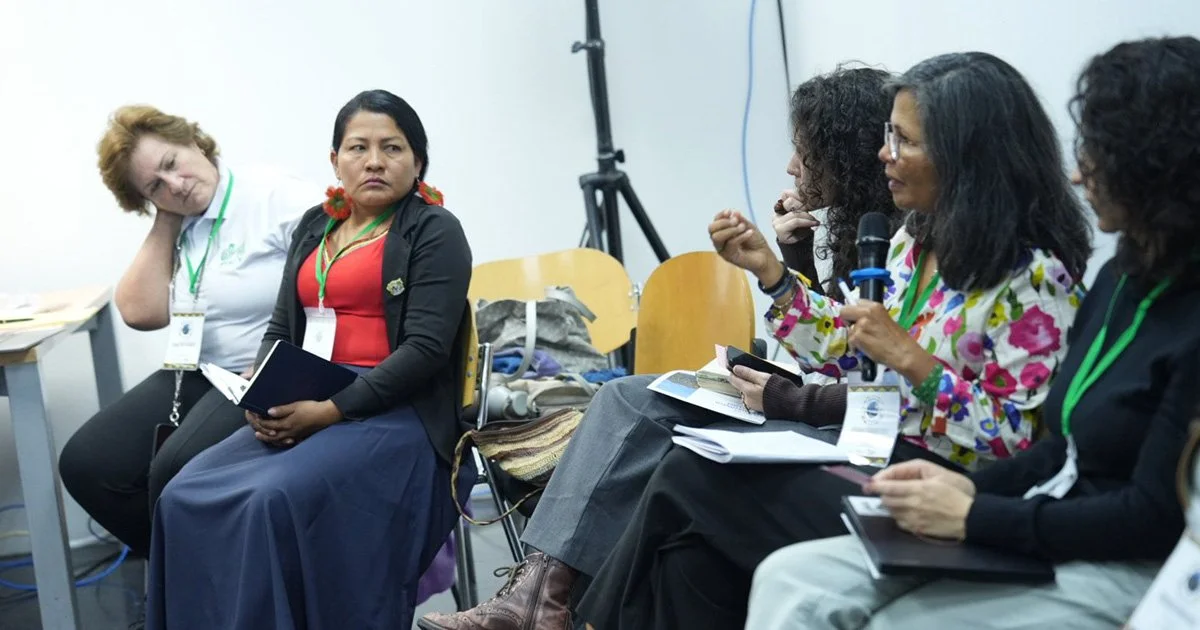The SPA’s Participation in the V Summit of Amazonian Presidents
On August 22, 2025, the city of Bogotá, Colombia, hosted the V Summit of Presidents of the Member Countries of the Amazon Cooperation Treaty Organization (ACTO). In the days leading up to the Summit, civil society and Indigenous organizations organized a range of activities and side events to enrich reflections on the future of the Amazon, especially on the road to COP30, the “Amazonian COP.”
The Science Panel for the Amazon (SPA) actively took part in these spaces, including the Amazon Dialogues, an initiative led by ACTO. These discussions were built on a series of virtual dialogues held between July 24 and August 6, which addressed critical topics for the region, such as climate change, socio-bioeconomy, security, and biodiversity. The in-person Amazon Dialogues, held on August 19 and 20 at the National University Library in Bogotá, featured 10 table discussions aimed at refining civil society’s recommendations for government representatives attending the Summit.
Marielos Peña-Claros, SPA Co-Chair, participating in the Amazon Dialogues
Marielos Peña-Claros, SPA Co-Chair, and Gabriela Arnal, SPA Communications Manager, took an active role in three of these tables: Forests and Biodiversity; Economy for Sustainable Development; and Fire Management, Variability, and Climate Action. In these sessions, they emphasized the key recommendations put forward by the Panel in its publications, highlighting the importance of Amazonian connectivity, a concept central to SPA’s forthcoming Assessment Report, to be launched at COP30.
Peña-Claros contributed to the development of the civil society recommendations and was appointed to present them at the meeting between Presidents, civil society, and Indigenous Peoples on August 22. This high-level dialogue included Colombian President Gustavo Petro; Brazilian President Luiz Inácio Lula da Silva; Bolivian President Luis Arce Catacora; Ecuadorian Vice President María José Pinto; as well as the Foreign Ministers of Peru, Elmer Schialer; Suriname, Melvin Bouva; and Venezuela, Yván Gil. Addressing these leaders, Peña-Claros delivered a speech calling on Amazonian presidents to unite in defense of connectivity as a key solution to the climate crisis, vital for the well-being of the planet.
The SPA also played a prominent role in several side events throughout the week. Peña-Claros spoke in two important discussions at the Indigenous Pavilion. The first, “Towards a Pan-Amazon Intercultural Climate Pact: From Bogotá to Belém,” during which she shared her perspective on the Pan-Amazon Pact, an initiative of the Amazonian Networks Network, of which the SPA is a member. The second, “The Indigenous NDC of the Amazon Basin: Contributions of Indigenous Peoples to Climate Balance,” where she reflected on the crucial role of Indigenous Peoples in climate mitigation and adaptation, and the value of their contributions.
Germán Poveda, SPA Lead Author and member of the SPA’s Science Steering Committee
On August 19, the SPA participated in the panel “Flying Rivers: The Amazon’s Best-Kept Secret.” This event featured multiple experts, including Germán Poveda, SPA Lead Author and member of the SPA’s Science Steering Committee. In a clear and engaging presentation, Poveda highlighted the importance of Amazonian hydroclimatic cycles for the region and the planet, while also drawing attention to SPA’s publications and contributions to this vital topic.
Marielos Peña-Claros, SPA Co-Chair, Public Hearing: Alternatives for a Fossil-Free Amazon
On August 21, Peña-Claros addressed the Public Hearing: Alternatives for a Fossil-Free Amazon, organized by Parliamentarians for a Fossil-Free Future at Colombia’s National Congress. Representing both the SPA and the Amazon Network of Georeferenced Socio-Environmental Information (RAISG), she presented key data to inform reflections on a just and sustainable energy transition in the region, addressing the challenges posed by hydropower and pointing to alternative pathways. In this forum, she again underscored the importance of maintaining and restoring Amazonian connectivity, highlighting the collaborative work done with the Amazon Waters Alliance (AAA), the NorAmazonian Alliance (ANA), and RAISG.
SPA Co-Chair Carlos Nobre spoke remotely at an event organized by the Coordinator of Indigenous Organizations of the Amazon Basin (COICA), titled “Amazon in Danger of Extinction.” The event, driven by the 80x25 coalition, explored urgent actions needed to avoid a tipping point, aiming to protect and restore 80% of the Amazon by 2025. Other prominent speakers included Fany Kuiru, General Coordinator of COICA; Susana Muhamad, former Minister of Environment of Colombia; and Alicia Guzmán, Technical Coordinator of the 80x25 initiative.
II Meeting of the Amazonian Networks Network (Red de Redes Amazónicas). Photo courtesy: IPA.
The SPA also joined the II Meeting of the Amazonian Networks Network, aimed at aligning efforts in the lead-up to COP30. Member organizations reflected on the Network’s progress to date and reviewed the impact points of the Pan-Amazon Pact, considering how to adapt them to the context of COP30. Discussions covered governance, communication, and advocacy strategies, and stronger engagement with Indigenous and local organizations.
The SPA’s participation in this wide range of activities surrounding the Summit was highly successful. It helped raise visibility for the Panel’s key recommendations and concepts, including those featured in its upcoming publications. The SPA's presence in high-profile spaces reaffirms the crucial role of science in shaping policies for a sustainable and resilient Amazon.
The Summit concluded with the Bogotá Declaration, which notably announced the creation of the Amazonian Indigenous Peoples Mechanism (MAPI). For SPA, the meeting reaffirmed the importance of ensuring a clear and consistent voice from civil society, while continuing to promote new mechanisms that expand collective capacities to advance the vision of The Amazon We Want.





